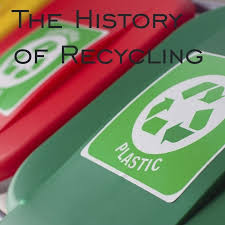|
Read the text and get ready to a test work
THE HISTORY OF RECYCLING
 1. Recycling has been a common practice throughout human history. In pre-industrial times, scrap made of bronze and other precious metals were collected in Europe and melted down for perpetual reuse, and in Britain dust and ash from wood and coal fires was down cycled as a base material in brick making. The main driver for these types of recycling was the economic advantage of obtaining recycled feedstock instead of acquiring virgin material, as well as a lack of public waste removal in ever more-populated sites.
2. Resource shortages caused by the world wars, and other such world-changing occurrences greatly encouraged recycling. Massive government promotion campaigns were carried out in World War II in every country involved in the war, urging citizens to donate metals and conserve fibre, as a matter of significant patriotic importance. Resource conservation programs established during the war were continued in some countries without an abundance of natural resources, such as Japan, after the war ended.
3. Paper recycling began in Britain in 1921, when the British Waste Paper Association was established to encourage trade in waste paper recycling. In 1973, the city of Berkeley, California began one of the first kerbside collection programs with monthly pick ups of newspapers from residences. Since then several countries have started and expanded various doorstep collection schemes. Around this time, Woodbury, New Jersey was also a forerunner of the recycling industry in the United States, being the first in the state to mandate it.
4. One event that initiated recycling efforts occurred in 1989 when Berkeley banned the use of polystyrene packaging for keeping McDonald's hamburgers warm. One effect of this ban was to raise the ire of management at Dow Chemical, the world's largest manufacturer of polystyrene, which led to the first major effort to show that plastics can be recycled. By 1999, there were 1,677 companies in the USA alone involved in the post-consumer plastics recycling business.
From Wikipedia
Test
1. Recycling has been a common practice throughout human history. In pre-industrial times, scrap made of bronze and other precious metals were collected in Europe and melted down for perpetual reuse, and in Britain dust and ash from wood and coal fires was down cycled as a base material in brick making. The main driver for these types of recycling was the economic advantage of obtaining recycled feedstock instead of acquiring virgin material, as well as a lack of public waste removal in ever more-populated sites.
2. Resource shortages caused by the world wars, and other such world-changing occurrences greatly encouraged recycling. Massive government promotion campaigns were carried out in World War II in every country involved in the war, urging citizens to donate metals and conserve fibre, as a matter of significant patriotic importance. Resource conservation programs established during the war were continued in some countries without an abundance of natural resources, such as Japan, after the war ended.
3. Paper recycling began in Britain in 1921, when the British Waste Paper Association was established to encourage trade in waste paper recycling. In 1973, the city of Berkeley, California began one of the first kerbside collection programs with monthly pick ups of newspapers from residences. Since then several countries have started and expanded various doorstep collection schemes. Around this time, Woodbury, New Jersey was also a forerunner of the recycling industry in the United States, being the first in the state to mandate it.
4. One event that initiated recycling efforts occurred in 1989 when Berkeley banned the use of polystyrene packaging for keeping McDonald's hamburgers warm. One effect of this ban was to raise the ire of management at Dow Chemical, the world's largest manufacturer of polystyrene, which led to the first major effort to show that plastics can be recycled. By 1999, there were 1,677 companies in the USA alone involved in the post-consumer plastics recycling business.
From Wikipedia
Test
|
|